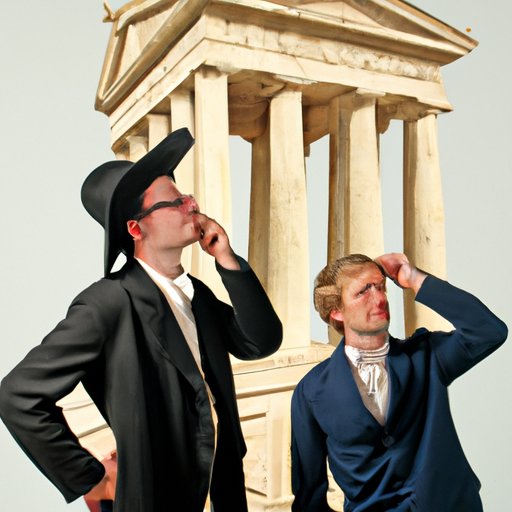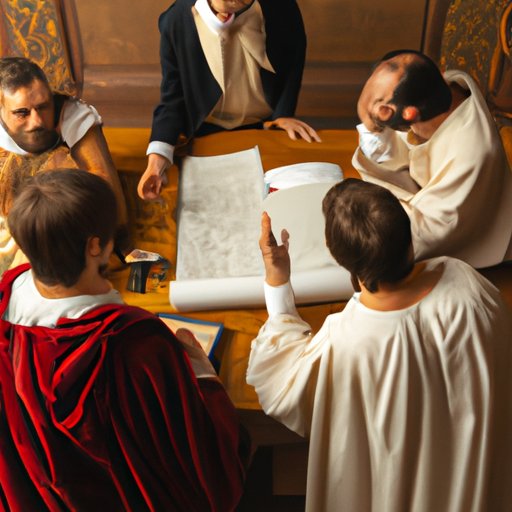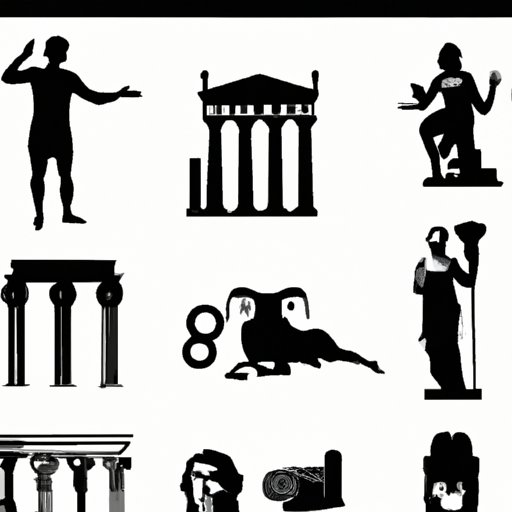Introduction
Western culture is a term used to describe the culture and customs of countries in Europe, North America, and Australasia. It encompasses a wide range of beliefs, values, and traditions, from the ancient Greeks and Romans to the present day. This article will explore the philosophical foundations, historical development, and impact of Ancient Greek and Roman civilizations, Christianity, and modernism on the establishment of Western culture.

Analyzing the Philosophical Foundations of Western Culture
The philosophical foundations of Western culture can be traced back to the ancient Greeks. The ancient Greek philosophers such as Plato and Aristotle developed a system of thought that had a profound influence on Western civilization. They explored questions of morality, politics, and science, which laid the groundwork for later developments in the West. The ancient Greeks also developed the concept of democracy, which has become one of the defining characteristics of Western culture.
Roman philosophy also played an important role in the development of Western culture. The Romans adopted many of the ideas of the ancient Greeks and expanded upon them. Their emphasis on law and order, as well as their contributions to architecture, engineering, and urban planning, have had a lasting impact on the West.

Examining the Historical Development of Western Culture
The ancient Greek and Roman civilizations were the first major civilizations to develop in the West. The Greeks developed an advanced system of government, art, literature, and science, while the Romans created a powerful empire that spread throughout Europe. Both civilizations made significant contributions to the development of Western culture.
Christianity was another major factor in the development of Western culture. Christianity began in the Middle East and spread throughout Europe, bringing with it a new set of beliefs and practices. Christianity shaped the art, literature, and architecture of the West, as well as its legal systems and social structures.
The Renaissance, or “rebirth” of classical learning, was also a major factor in the development of Western culture. This period saw a renewed interest in the arts, literature, and sciences, as well as a shift away from religious dogma towards humanism. The Renaissance also saw the rise of science, which had a profound impact on Western culture.
Exploring the Contributions of Ancient Greek and Roman Civilizations to Western Culture
The ancient Greeks and Romans made significant contributions to the development of Western culture. Their political systems, including democracy, set the foundation for modern forms of government. They also developed sophisticated systems of art, literature, and science, which have been passed down through the centuries.
The Greeks and Romans also made significant contributions to mathematics and scientific knowledge. Their discoveries and inventions in these fields laid the groundwork for further advances in the West. In addition, the Romans developed a sophisticated system of law and order, which has been adapted by many Western nations today.
Investigating the Role of Christianity in Shaping Western Culture
Christianity has had a profound influence on the development of Western culture. Its beliefs and practices shaped the art, literature, and architecture of the West, as well as its legal systems and social structures. Christianity also provided a moral and ethical framework for the West, which has been adopted by many nations.
The Christian faith has also had a deep influence on the way people think and behave. Many of the values and principles that are part of Western culture, such as honesty, respect, and compassion, have their roots in Christianity. This has had a major impact on the way people live in the West and how they interact with each other.

Discussing the Significance of the Renaissance in Establishing Western Culture
The Renaissance was a period of great change in the West. It marked the transition from the Middle Ages to the modern era and was marked by a renewed interest in the arts, literature, and sciences. This period also saw a shift away from religious dogma towards humanism and the rise of science, which had a profound impact on Western culture.
The Renaissance also saw the emergence of new forms of expression, such as the novel and opera. It also saw the rise of the printing press, which enabled the spread of knowledge and ideas. These developments had a major impact on the development of Western culture.
Examining the Impact of the Enlightenment on Western Culture
The Enlightenment was another major period in the development of Western culture. This period saw a renewed focus on reason and rational thought, as well as a rejection of traditional religious beliefs. The Enlightenment also saw the French Revolution, which overthrew the monarchy and established a new form of government based on the principles of liberty, equality, and fraternity.
The Enlightenment also saw the rise of the Industrial Revolution, which transformed the economies of the West and led to the development of new technologies. This period also saw a greater emphasis on individual rights and freedoms, which continue to shape Western culture today.

Investigating the Influence of Modernism on Western Culture
Modernism has also had a major influence on the development of Western culture. This period saw the emergence of various cultural movements, such as surrealism, cubism, and abstract expressionism, which changed the way people viewed art and expression. Modernism also saw the rise of new technologies, such as television, which had a major impact on the way people communicate and interact.
Modernism also saw a greater emphasis on individualism, as well as an increased focus on personal freedom and choice. These values continue to shape Western culture today, and have had a major impact on the way people think and behave.
Conclusion
Western culture has been shaped by a number of factors, including the philosophical foundations of the ancient Greeks and Romans, the historical development of Christianity, the significance of the Renaissance, the impact of the Enlightenment, and the influence of modernism. Each of these factors has contributed to the development of Western culture, and has had a major impact on the way people think and behave. By understanding these factors, we can gain a better understanding of the history and development of Western culture.
(Note: Is this article not meeting your expectations? Do you have knowledge or insights to share? Unlock new opportunities and expand your reach by joining our authors team. Click Registration to join us and share your expertise with our readers.)
